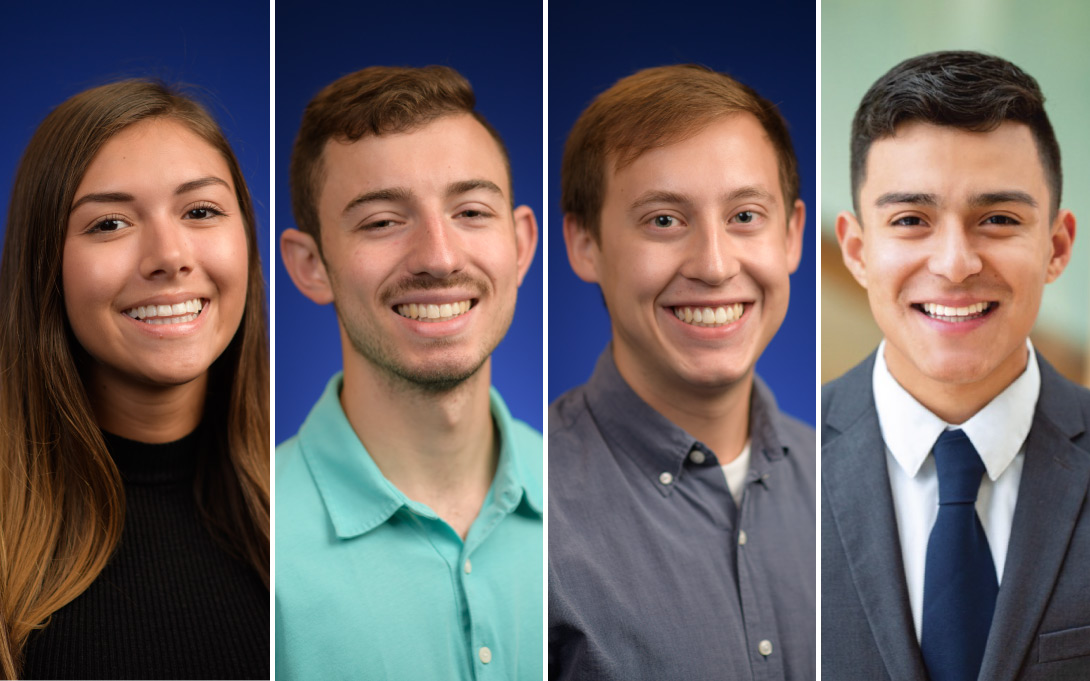
By Jack Eichner (BA '21)
This week marks one year since the University of Michigan’s campus shut down. Questions swirled as students had to adjust to virtual learning while simultaneously adapting to new living situations in a rapidly evolving environment. And one year later, we are still becoming accustomed to new realities and ways of working—from Zoom classes, to smaller social circles and restrictions on an already disappointing football season. As the light at the end of the tunnel continues to brighten, we highlight four Ford School undergraduates who have found ways to lead the way through difficult circumstances and continue to make a positive impact on their communities with student support and outreach, music, and research.
Mariana Boully Perez (BA ‘21), executive board member of Students of Color in Public Policy (SCPP), got involved during the fall of her junior year because the undergraduate chapter had all but disappeared after most of the club’s members graduated in 2019. Boully Perez wanted to get involved to build the club for future Ford School students. Along with other SCPP members, Boully Perez worked to promote the group, both internally within the Ford School and, importantly, to students of color across campus: “SCPP is making an impact because we reach out to multicultural organizations on campus who might not know about the Ford School and what it has to offer.” SCPP also provides Ford School application review sessions for prospective students of color, offering advice and edits on essays, as well as answering questions about the school.
Boully Perez sees a silver lining in how the pandemic has forced SCPP to adapt. She says that the virtual environment has actually made it easier for SCPP members to interact: “We all joined a GroupMe, and we Zoom...and now when we have classes [together], we text each other.” Boully Perez notes that this type of communication might not have been as robust if not for the virtual nature of today’s academic environment.
Matthew MacPhail (BA ‘21), a member and music director for “Compulsive Lyres,” an a capella group on campus, joined the group to make new friends and further explore his interest in music. MacPhail most enjoyed performing in front of different audiences, which isn’t possible in the current environment. Despite the pandemic’s limitations on his group’s ability to perform in front of audiences, he says the pandemic has made him and his team members realize just how important the group is to them. “We have rehearsals outside, in masks, in ten degree weather. Which just shows how committed everyone is to making it work.”
David Carpenter (BA ‘21) is a co-editor in chief of the Michigan Foreign Policy Council (MFPC), a student run club that promotes non-partisan foreign policy research at the University of Michigan. Carpenter joined MFPC during his freshman year because he wanted to further pursue his interest in foreign policy. He worked his way up the ranks of the club, serving as president during his junior year before stepping into the co-editor in chief role this past fall.
Carpenter says “there isn’t a big presence of foreign policy-focused organizations on campus, especially ones that build the skills that MFPC does. MFPC has also allowed students with similar interests to connect with each other. He notes, however, that “the social aspect has been really lacking” and that “it’s really hard to have those spontaneous interactions” between club members because of the pandemic’s limitations.
In-person meetings and discussions were a key aspect of the club’s activities, and as president of the club when COVID hit last spring, he was responsible for completely reshaping MFPC on the fly, and he said that “it was very tough to balance original research deadlines and goals with COVID's impact on mental health and stress among our membership.” Carpenter says that this experience has made him a better leader. “It has taught me to accept change more easily and to be more flexible. It also made me more empathetic with membership and able to connect with them more.”
Walter Aguilar (BA ‘21), says that COVID actually afforded him a novel research opportunity. In April, Aguilar started working with Professor Stephanie Leiser, who leads the Michigan Local Government Fiscal Health Project at the Center for Local, State, and Urban Policy (CLOSUP). Aguilar commented on the importance of the research in helping communities protect their residents from COVID: “the research that CLOSUP does with the Michigan Public Policy Survey...is especially important with COVID because there were so many jurisdictions that had no emergency plans in place prior to the pandemic.” Aguilar hopes that his research will “help jurisdictions learn from this and better prepare them for the future."
Aguilar says that, while the pandemic has altered other parts of his college experience, like his participation in Michigan’s Marching Band, the Ford School’s extensive research opportunities for students provided him with an opportunity that he might not have otherwise had: “This opportunity would only come from the Ford School, and it’s another aspect of the school that makes it a top program. Having these opportunities for undergraduates speaks to the Ford School’s dedication to them.”